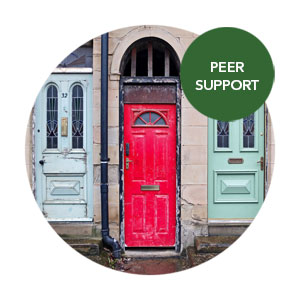This is the third of a three-part article on honesty, open-mindedness, and willingness. Learn about effective ways to communicate with your support system, including peers in recovery, supportive family members, 12-step sponsor, life mentors, spiritual leader, or recovery coach.
What is H.O.W. Communication?
When someone is in active addiction, there is very little healthy communication. There is, however, a lot of unhealthy communication—which includes lying, manipulating, refusing to listen—basically doing the same destructive things over and over again.
Healthy communication means being honest, being open to hearing someone else’s point of view, and being willing to change bad habits in order to improve your relationships. H.O.W. communication skills strengthen your recovery.
Willingness in Addiction Recovery
Hopefully, by now you’ve worked on opening your eyes with honesty and opening your ears by listening to others with an open mind. It’s time to discuss the third piece of the puzzle, which is having the willingness to put your feet on the path of action. Try these steps to becoming more willing:
- Weigh the costs and benefits. Take a searching look at your old ways of doing things, and start thinking about them in cost/benefit terms. Was the short-term high worth the consequence? For instance, the extra piece of pie tastes great (benefit) but leads to weight gain (costs). Then think about the benefits of changing. Do the benefits of changing outweigh the bad consequences of not changing? If your answer is yes, then you are ready to put that willingness into action.
- Make a decision to change. This doesn’t mean “Change right away.” It means making a commitment to changing, even if the details of how you’ll do it aren’t clear right now. Write that decision down, and put some goal dates with it. It also helps to tell someone else about your decision, whether it’s a sponsor, spouse, or friend in recovery. Give them permission to ask you how it’s going.
- Accept push-pull feelings. The word for the “push-pull” feelings is ambivalence. This is a normal human reaction to change; we’ve all experienced the feeling of being pulled in two opposite directions. Your feelings against changing are real—don’t ignore them. Accept the fact that it’s totally normal to feel this way, and then take a closer look at the costs and benefits of change. If you are honest and open, your decision to change will help you get over this ambivalence.
- Set SAM Goals. Start with Specific, Attainable, and Measurable goals. You set yourself up for success by choosing realistic, achievable goals. If you realize you’ve set a bar too high, retool your goals. Then act on them in a concrete, measurable way. But at the same time, don’t be a slacker and set your goals so low that you get nothing accomplished. Once you start reaching these realistic goals, make sure you celebrate your victories!
Choosing to do Something
Willingness in addiction recovery means doing something out of choice, not because you were forced to do it. It means your mind is more receptive and that you are embracing change intentionally and with courage.
Consider making a to-do list items to enhance willingness in addiction recovery:
- In the next week, pick one of your behaviors that are causing you problems. Do a cost/benefit list about changing it.
- Within two weeks make a decision on the item you identified. Write your decision using the phrase “I am willing to_____.”
- In the next 30 days, explore different options for the change, then pick the one that suits you best. Write that down with goal dates.
Here’s a personal success story:
When Talia first got sober, she claimed that her addiction had only affected her personal relationships. She lost custody of her daughter, but she didn’t lose her job. But at two months sober, she heard someone say in a meeting that he was passed over for a promotion because he missed work due to being hungover. At that moment, Talia realized that her addiction really had hurt her career. She had training as an X-ray tech but she’d only taken jobs as a restaurant server because no one cared if she called in “sick”—or didn’t call in at all. That night, she wrote in her journal that she’d been lying to herself all this time about how badly her addiction had messed up her professional life. She got back on track with her career and was able to regain custody because she had gotten honest, open-minded, and willing.
The other articles in this series are H.O.W Communication – Honesty and H.O.W Communication: Open-Mindedness.
Read more CeDAR Education Articles about Peer Support




